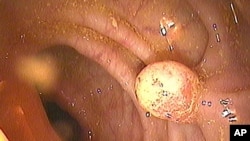By manipulating a single gene, researchers turned cancerous colorectal cells back into normal tissue in experiments with mice. The strategy may eventually become one of the mainstays for a hard-to-treat malignancy, which kills nearly 700,000 people a year.
If caught early using a screening technique called a colonoscopy, colorectal cancer is easily treated by surgery.
But once cancer spreads, it becomes very hard to conquer, according to Scott Lowe, a researcher with the Memorial Sloan Kettering Cancer Center in New York.
Toxic chemotherapy drugs are often used in an effort to kill malignant cancerous cells. But they also kill healthy cells and many patients end up dying anyway.
As the cancer evolves, Lowe says a tumor suppressor gene called Apc becomes less active in the vast majority of patients.
But his team genetically manipulated Apc with a surprising result.
“The cells basically went back to normal. They didn’t die, they didn’t go away; they underwent the process of differentiation where a stem-like cancer now becomes a differentiated normal cell that seems to have many of its normal functions," said Lowe.
Stem cells are master cells that, in different conditions, can be transformed into any kind of cell.
Manipulating a human Apc tumor suppressor gene in mice with colorectal cancer, Lowe’s team saw tumor growth stop in most of the rodents and begin switching back to normal tissue within four days.
After two weeks, tumors were eliminated, and there were no signs of cancer months later.
The research was reported in the journal Cell.
Lowe stresses that the work is early and treating cancer by restoring the function of tumor suppressor genes could be years away.
He explains that each colon cancer is different, caused by genetic mutations unique to each patient.
But he predicts that identifying and correcting DNA abnormalities will likely join chemotherapy one day, as a standard of cancer treatment.
“For now what we found is something I think is a really profound effect, a surprisingly profound effect, particularly given that we see it in cells that have become real cancer cells with other genetic changes that by and of themselves can contribute to cancer," he said.
Lowe says 90 percent of colorectal tumors contain mutations that have a silenced Apc tumor suppressor gene, suggesting that reactivating the gene might cure the vast majority of colon cancer patients.
Different mutations are involved in other types of cancer, and he suggests that they, too, could someday be reversed through genetic manipulation.




